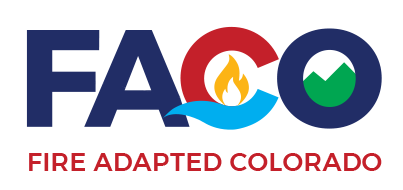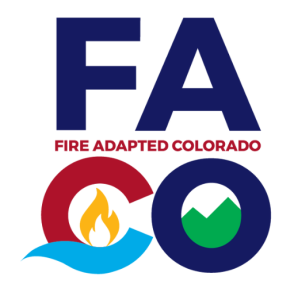Participating in FACO
BENEFITS
- Online networking space, bi-monthly network calls, and topical communities of practice
- In-person and online learning exchanges, training, workshops, and webinars
- Network directory organization or agency listing on the FACO website
- Working groups on areas of mutual interest
- Opportunities to share insights on programs and policies that affect FAC work
- At cost training opportunities
- Reduced Colorado Wildland Fire Conference & Workshop registration rates
- Online Webinars
- Added capacity/project support (sharing templates and examples to reduce duplication, mentorship, grant proposal draft review, copy editing, use of zoom pro account, etc.)
- Opportunity Fund micro-grant eligibility to support community fire adaptation work
- Organization highlights shared in monthly newsletter
EXPECTATIONS
- Commit to creating a safe and open learning environment where everyone is a teacher and a learner.
- Contribute to a culture where people are encouraged to speak up, learn from mistakes, and listen to understand all perspectives.
- Meet community members and other network participants where they are. Everyone is in a different stage of readiness and maturity with their fire adaptation efforts and has different needs and strengths to share.
- Represent your organization and share our collective efforts.
- Help others make connections when you recognize the need and value of a new connection.
- Leverage resources. You may bounce ideas off other network participants to find efficiencies and creative, effective ways to use your limited resources.
- Share your resources and expertise with other network participants to support their efforts.
- Be a trusted resource for wildfire resilience information and support.
- Share information and resources provided by FACO and other network participants with local partners as appropriate.
- Expand beyond fuel mitigation and residential risk reduction programs.
- Build partnerships to work across boundaries and jurisdictions.
- Understand your community demographics. Check your assumptions and support at-risk populations.
- Be a subject matter expert. If you don’t have an answer, seek one and follow-up.
- Focus on outcomes over outputs. Be mitigation oriented. Ask “How will this work lead to better fire outcomes?”
- Set up your profile, introduce yourself and participate by liking, sharing, and posting in our collaborative online workspace.
- Attend at least two FACO member calls, webinars, or virtual opportunities and at least one in-person opportunity each year.
- Leverage your expertise to support FACO initiatives.
- Share your content with FACO by adding staff to your distribution lists.
- Contribute at least one story, or blog post about your local fire adaptation work each year.
- Provide updates on your FAC work (annual renewal).
- Inform FACO of staffing and contact updates as they occur.
- Complete the network’s evaluation and feedback process when requested.
Discover the power of the FACO Network
See our Network Directory
Network Participants have detailed listings in our filterable FACO Network Directory.
Public & Curated Resources
Network Participants have access to both our public and resources curated specifically for the FACO Network.
Placement on Interactive Network Map
Network Participants are placed on our interactive GIS map allowing site visitors to find you by location.
Join FACO
Learn more and join the FACO Network today.

